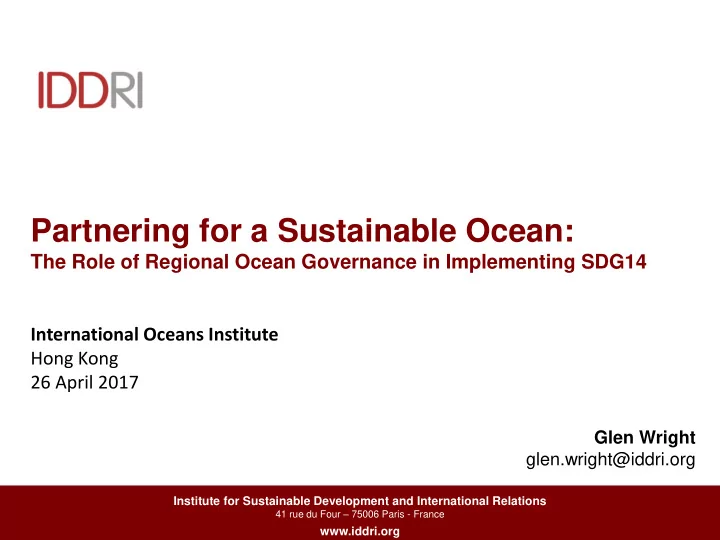

Partnering for a Sustainable Ocean: The Role of Regional Ocean Governance in Implementing SDG14 International Oceans Institute Hong Kong 26 April 2017 Celine MARCY, IDDRI Glen Wright glen.wright@iddri.org Institute for Sustainable Development and International Relations 41 rue du Four – 75006 Paris - France www.iddri.org
Key messages • Importance of regional partnerships and cooperation in implementing SDG14 • Regional ocean governance initiatives are already making a difference • Need to build engagement at the regional level
PROG report • Background and history of regional ocean governance • Overview of different mechanisms • Target-by-target analysis with case studies • Partnership case studies • Overarching issues, e.g. finance, capacity development
Regional ocean governance (1) • Transboundary nature of marine resources &threats to the marine environment present unique challenges: • cannot be tackled effectively by States acting individually • implies a responsibility for national governments to collaborate to achieve SDG14 • UNCLOS, Article 197: encourages States to cooperate “as appropriate, on a regional basis, directly or through competent international organisations for the protection and preservation of the marine environment, taking into account characteristic regional features ” • Highlighted in the 2030 Agenda
Regional ocean governance (2) Takes many forms, including: • Regional Seas Conventions and Action Plans • Regional Fisheries Bodies • Political and economic organisations • Leader-driven initiatives • Large Marine Ecosystem (LME) projects
Tackling SDG14 targets at the regional level 1. Marine pollution 2. Sustainable management and protection 3. Ocean acidification 4. Sustainable fisheries 5. Conservation 6. Fisheries subsidies 7. SIDS and LDCs a. Knowledge, capacity building & technology transfer b. Artisanal fisheries c. Implementation of international law
Example: North East Atlantic • OSPAR MPA network/NEAFC fisheries closures • The “Collective Arrangement”
Example: The Coral Triangle
Example: East African Coast
Example: Sargasso Sea
Enabling conditions Some regions benefit from favourable enabling conditions that have allowed them to make impressive progress, while others have created such conditions through cooperation: • Strong existing legal and policy frameworks; • A history of active engagement of States in regional processes; • A clear & present economic/environmental imperative; • Long-term political and institutional stability; • Stakeholder engagement & community buy-in; • Availability of financing for capacity development.
Lessons learned Regional contexts are highly diverse, but there are a number of common lessons learned: • Regional champions can play a major role; • Financing should be long-term, flexible, sustainable, and support both projects & capacity development; • Need for a common vision or purpose; • An appropriate institutional structure; • Targets and deadlines are necessary, but not sufficient. Need action, as well as words.
What’s next for regional ocean governance? • Regional ocean governance to play a key role in harmonising national approaches and increasing ambition • Development of regional partnerships for sustainable management of ocean • June conference a key step – partnership dialogues • Opportunities for region-to-region exchange
Glen Wright Institute for Sustainable Development and International Relations (IDDRI) glen.wright@iddri.org
Recommend
More recommend